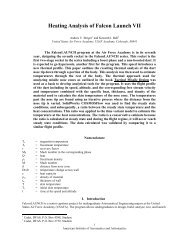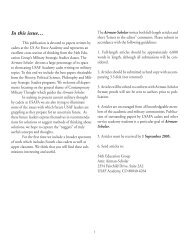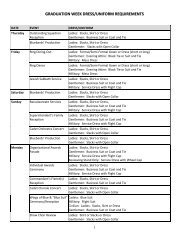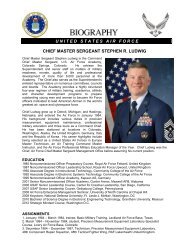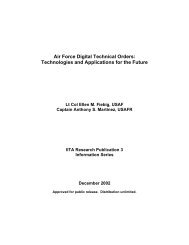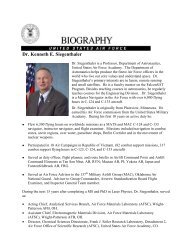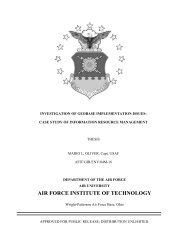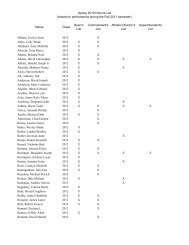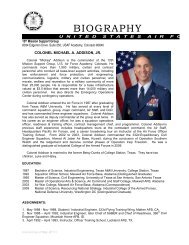the rollback of south africa's biological warfare program
the rollback of south africa's biological warfare program
the rollback of south africa's biological warfare program
Create successful ePaper yourself
Turn your PDF publications into a flip-book with our unique Google optimized e-Paper software.
South Africa negotiated <strong>the</strong> withdrawal <strong>of</strong> Cuban troops in exchange for <strong>the</strong><br />
independence <strong>of</strong> Namibia, and by <strong>the</strong> end <strong>of</strong> <strong>the</strong> year, a deal was reached. The<br />
Soviet and Cuban threat that had helped give rise to Project Coast rapidly<br />
began to recede. However, <strong>the</strong> ANC/MK continued <strong>the</strong>ir guerrilla campaign,<br />
including <strong>the</strong> bombing <strong>of</strong> civilian targets. 119<br />
At <strong>the</strong> beginning <strong>of</strong> 1989, President Botha became ill with heart<br />
problems and was replaced on an interim basis by F.W. de Klerk, an “outsider”<br />
to <strong>the</strong> state security system (including Project Coast). In April 1989, South<br />
African troops were confined to barracks in Namibia and were withdrawn by<br />
<strong>the</strong> end <strong>of</strong> <strong>the</strong> year. In September 1989, de Klerk was elected and inaugurated<br />
as State President and shunted Botha aside. De Klerk began his own five-year<br />
plan <strong>of</strong> ending apar<strong>the</strong>id. Part <strong>of</strong> his task included trying to establish civilian<br />
control over <strong>the</strong> security apparatus and rein in <strong>the</strong> “securocrats” and secret<br />
projects (like Project Coast). Talks with Mandela reached <strong>the</strong>ir climax, and top<br />
ANC prisoners, such as Walter Sisulu, were released. Finally, in February<br />
1990, de Klerk lifted <strong>the</strong> ban on <strong>the</strong> ANC, PAC, and South African Communist<br />
Party and released Nelson Mandela.<br />
De Klerk’s decision to release Nelson Mandela and lift <strong>the</strong> ban on <strong>the</strong><br />
ANC initiated a four-year period <strong>of</strong> negotiation and contention. In 1991, <strong>the</strong><br />
Conference for a Democratic South Africa (CODESA) process <strong>of</strong> negotiations<br />
began, involving <strong>the</strong> government, <strong>the</strong> ANC and o<strong>the</strong>r parties. In 1992, <strong>the</strong><br />
negotiation process slowed and concerns mounted as <strong>the</strong> campaign <strong>of</strong> rolling<br />
violence spread throughout South Africa. Violent clashes continued, especially<br />
in Kwazulu-Natal. At <strong>the</strong> same time, mistrust <strong>of</strong> de Klerk and <strong>the</strong> National<br />
Party government grew among ANC leaders. There was a real concern by all<br />
parties that <strong>the</strong> situation in South Africa would “ spin out <strong>of</strong> control” before a<br />
negotiated settlement was reached. 120 The fear <strong>of</strong> collapse ultimately provided<br />
an important incentive that eventually brought most parties back to <strong>the</strong><br />
negotiating table. In 1993, negotiations stalled, and violence continued. Chris<br />
43




